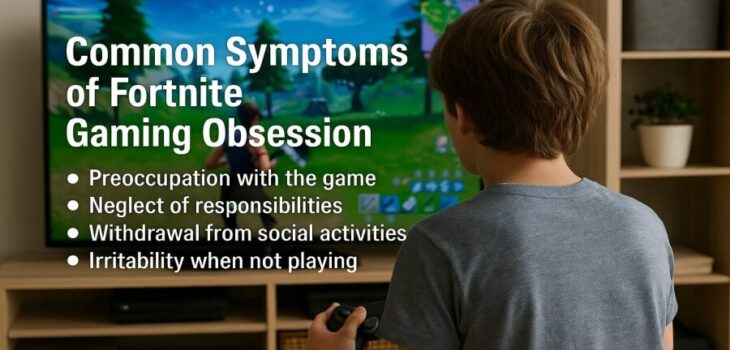 Game
Game
Common Symptoms of Fortnite Gaming Obsession | Fortnite Child…
Fortnite’s vibrant graphics, engaging gameplay, and the constant allure of new seasons and challenges have made it a global phenomenon, particularly among children and teenagers. While many youngsters enjoy it as a healthy form of entertainment and social interaction, the immersive nature of the game can unfortunately lead to addictive behaviors. Recognizing the signs of Fortnite addiction symptoms, especially when it comes to Fortnite child addiction, is paramount for parents, educators, and caregivers. Early identification allows for timely intervention and support, ensuring that the virtual world doesn’t overshadow crucial aspects of a child’s development and well-being. Understanding these specific indicators can help safeguard young players from the potential pitfalls of excessive gaming.
Identifying Key Behavioral Symptoms of Fortnite Child Addiction
Several behavioral changes can signal that a child might be developing an unhealthy relationship with Fortnite. An intense preoccupation with the game is a significant red flag. Children struggling with addiction may constantly talk about Fortnite, watch videos related to it, and think about it even when they are not playing. This mental absorption can significantly interfere with their ability to focus on schoolwork, family time, and other activities.
Neglecting responsibilities is another crucial indicator. Homework may go undone, chores may be ignored, and even basic hygiene might suffer as the child prioritizes playing Fortnite. Promises to complete tasks after “just one more game” become frequent and are rarely kept. This avoidance of real-world obligations in favor of virtual engagement is a hallmark of addictive behavior.
A clear sign of addiction is the loss of control over playtime. Despite parental limits or their own intentions, children with Fortnite addiction often find themselves unable to stop playing. Attempts to reduce their gaming time may be met with resistance, frustration, or even defiance. This inability to adhere to self-imposed or external boundaries highlights the compulsive nature of their gaming.
Withdrawal symptoms can manifest when a child is prevented from playing Fortnite. These can include increased irritability, anxiety, sadness, restlessness, and difficulty concentrating. They may become easily agitated or throw tantrums when their access to the game is restricted, demonstrating their psychological dependence.
Furthermore, continued excessive gaming despite negative consequences is a serious concern. Even when their grades are slipping, they are losing friendships outside of the game, or they are facing disciplinary actions at home or school due to their gaming, the child may be unable to reduce their playtime. This inability to learn from negative experiences underscores the powerful pull of the addiction.
Social and Emotional Red Flags in Children Addicted to Fortnite
Fortnite addiction can significantly impact a child’s social and emotional development. Social isolation is a common symptom, as the child may withdraw from real-world interactions with family and friends to spend more time playing. They might lose interest in previously enjoyed hobbies and activities that don’t involve the game, leading to a narrowing of their social circle and experiences.
Changes in their emotional state are also frequently observed. Children struggling with Fortnite addiction may exhibit increased anxiety and depression, particularly when they are not playing or when their gaming is interrupted. They might use the game as an escape from real-life problems or negative emotions, creating an unhealthy coping mechanism.
Lying or concealing the extent of their gaming is another significant emotional and behavioral indicator. They might hide the amount of time they spend playing, sneak in extra gaming sessions, or make excuses for neglecting their responsibilities due to their gaming. This dishonesty often stems from a fear of punishment or having their gaming privileges taken away.
Physical Manifestations of Excessive Fortnite Play in Children
Excessive Fortnite play can also lead to various physical health issues in children. Sleep deprivation is a common problem, as they may stay up late into the night to play, leading to daytime fatigue, difficulty concentrating in school, and mood swings. Chronic sleep loss can have significant negative impacts on their overall health and development.
Eye strain and headaches are frequent complaints due to prolonged screen time. Children may also experience dry eyes and blurred vision. Additionally, the sedentary nature of excessive gaming can contribute to weight gain and an increased risk of developing obesity-related health problems later in life.
In some cases, children may also develop poor posture, back pain, and repetitive strain injuries in their hands and wrists due to prolonged and intense gaming sessions. These physical symptoms serve as tangible reminders of the potential negative health consequences associated with unchecked gaming habits.
Addressing Fortnite Child Addiction: Intervention and Support
Recognizing these Fortnite addiction symptoms, specifically in the context of Fortnite child addiction, is the crucial first step towards intervention. Open and honest communication between parents and children is essential. Setting clear boundaries and time limits for gaming, encouraging alternative activities, and monitoring their online interactions are vital preventative measures.
If a child exhibits several of these symptoms, seeking professional help is strongly recommended. Child psychologists or therapists specializing in behavioral addictions can provide guidance and support for both the child and the family. Creating a balanced lifestyle that prioritizes school, social interaction, physical activity, and family time is key to helping children develop a healthy relationship with gaming and technology.
Concerned about Fortnite addiction? Learn more about available resources and take the first step towards a healthier balance today.